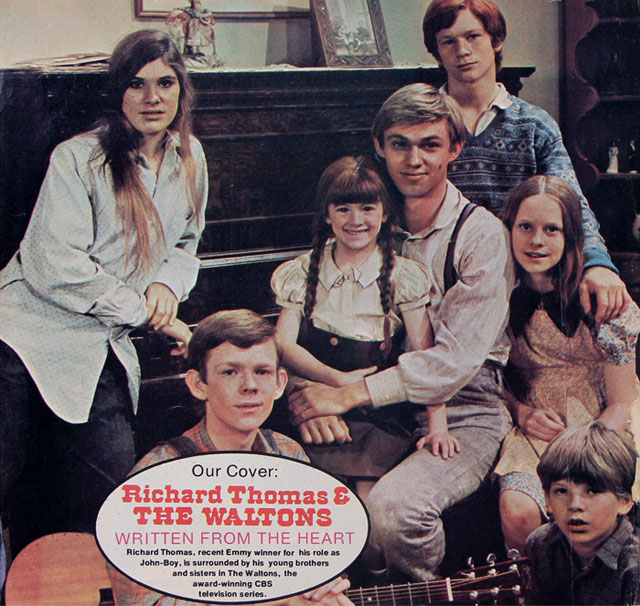 |
|||
|---|---|---|---|
| Return to Articles | <<< Article >>> | ||
Walton's in the Media. |
Los Angeles Times 1972 |
|---|

By Earl Hamner
There were eight of us. Tall, lean, fine-boned, redheaded youngsters growing up in the Blue Ridge Mountains of Virginia during the depression of the 1930's. My father called us his "thoroughbreds" and put us on a pedestal. CBS calls us The Waltons and put us on television.
We had never heard of television back in 1933. We were Baptists, and our social life centered around the Baptist church. When we didn't attend Wednesday night prayer meeting or Friday night choir practice or Sunday night preaching or Monday night's meeting of the Baptist Young People's Union, we got to listen to the radio.
And what fine entertainment reached even into the backwoods of the Blue Ridge: Lum and Abner, Amos and Andy, Fred Allen, Charlie and Edgar, One Man's Family, The Lone Ranger. We even sat front-row center with Mr. First Nighter.
On the night Orson Welles made us believe that we had been invaded by Martians, most of us in our village gathered at the Baptist church and prayed for deliverance. An Episcopalian came by around midnight and told us it was safe to go home. We went, but there are still people back home who believe that it was prayer that caused the Martians to retreat.
They seemed golden days then, and they do now in memory. We were in the midst of' the Great Depression, but nobody ever got around to telling us we were poor. The mill where my father had worked was closed, but my father was a hunter and we feasted on venison and quail and wild turkey from the mountain. We caught trout and catfish and bass from the Rockfish River. We raised hogs and cured our own hams. My mother canned surplus from the vegetable garden.
Spiritually we were sustained, not only by the Baptist church but by the old Saturday Evening Post, Roosevelt's fireside chats, Will Rogers' humor, Babe Ruth's home runs, a school which boasted at least one gifted teacher, the wonder of the changing seasons, which, in Virginia is spectacular, and the fascinating revelations that slowly came to one teen-age boy who yearned to write it all down and to figure out what it all meant.
I am still trying to figure it out, and I have reached some conclusions. My mother and father were unique people who loved each other very much and devoted their lives to their children out of that love. Being members of a large family we learned to share the hardships as well as the joys of those distant days. And being rural, we learned a kinship with the earth.
We were close to the realities of life and death, the naturalness of mating, of birth, the changing weathers, the whole cycle of life. We were the happiest of people.
Years later, after I had grown to manhood, I was surprised to learn that I had grown up in a "poverty pocket" in a "depressed area" and that we suffered a disease called "familism." The sociologists define "familism" as a "type of organization in which the family is considered more important than either other social groups or the individual."
We didn't know we were afflicted with "familism." We just thought we loved each other. We were demonstrative in expressing our love, kissing and hugging each other, especially at family reunions, when there would gather first, second and third cousins and other relatives with connections so tenuous that only my grandmother could be depended upon to tell exactly the degree of relationship.
The Waltons is about such a clan. People have asked how true the television family is to my own family. There is only one difference. For the sake of economy we have made a composite of two of my younger brothers. In the television family there are seven children rather than eight. The house is a replica of the house we lived in and where my mother still lives.
I think there is a need for The Waltons. Audiences in all entertainment media have been brutalized by crudities, vulgarity, violence, indifference and ineptitude. On The Waltons we are attempting to make an honest, positive statement on the affirmation of man. Lorimar, our production company, has assembled a superior cast, crew and production staff. Like the Waltons, we have become a family, and CBS, our network, a benevolent parent, has given us unfailing support and guidance.
William Faulkner once said that great writing comes from the human heart in conflict with itself. Much of today's entertainment seems written either from the groin or from somewhere in the area of the navel. The Waltons is written from the heart. I have not lived permanently in Virginia since 1940, but a Virginian never really lives some other place. He "resides abroad temporarily." His true home is Virginia, and I have never said goodbye to a Virginian without his replying: "Hurry back. Come to see us soon."
You are invited.
|
|
| Return to All Articles | <<< >>> |
|---|---|
|
|||||||||||
| About this Site / Links | Contact Us | FAQ | |||||||||
|---|---|---|---|---|---|---|---|---|---|---|---|